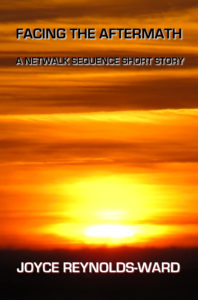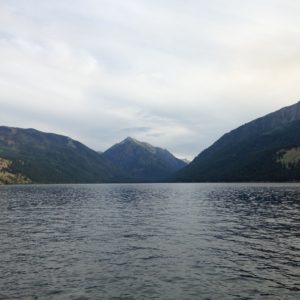So clearly I ran out of steam when it came to Fishtrap live-blogging. It wasn’t for a lack of things to write about; instead, there was a lot to pack into the day so that by 10 pm when I got home, I’d had enough and just wanted to vege out.
But it was a different type of intensity from going to a weekend science fiction convention. At the cons, I’m usually rushing to meet people, rushing to do panels/signing/reading, rushing to catch something in the dealer’s room before it goes away. No rush at Fishtrap, not really. All of us weeklong participants had morning three-hour workshops to attend. Then the afternoon panel or presentation, followed by open mic readings, followed by faculty readings after dinner. With a couple of exceptions, everyone went to the workshops, while not everyone went to the panels/presentations/readings (or at least every one). That meant the pace was slower to begin with.
The other big difference was that this was a forum to discuss craft, not business. There was only one editor from one press present; the rest of us were equally all writers. Now business did start creeping into discussions later on in the week, but for the most part we were focused on craft. It was about us being writers, not selling our writing.
Then most workshops had some sort of daily writing work. I think my workshop–the Uncanny, with Marjorie Sandor–had the most writing involved, but everyone was working on some sort of writing assignment throughout the week. My workshop had three evening writing assignments (as well as reading assignments), as well as several in-class assignments. None of the writing work was finished product but I definitely left with either starts or ideas for something like six or seven short stories or essays, as well as ideas for worldbuilding and structure for Netwalking Space.
Most of all, it was about words, and writing, and thinking about writing. Robert Michael Pyle has been a favored nature writer of mine for Wintergreen and The Dark Divide, but after this past week talking to Bob and listening to his keynote speech and listening to his prose and poems, I think he’s now my favorite living nature writer. We shared a thrill over pretty book covers (he liked the Beyond Honor cover), and talked a wee bit about the Klone’s Folly story I’m still developing. I didn’t know about Marjorie Sandor before this Fishtrap, but by golly I’m definitely a fan now. She is one of the best critique leaders I’ve worked with and her insights into the uncanny helped me pinpoint some developments in Netwalking Space. Plus she has written the best damn and uncanny second person present tense story EVER. Joe Wilkins turned me onto short prose poems, and Justin Hocking made me think about the power of lists in my writing. There were many more faculty members who shared lots of gems.
In any case, I took detailed notes during our workshops because Marjorie came up with observational gems including looking at expanding stories in the unplumbed gaps within scenes–instead of writing more and longer, she talked about going into various hot spots of the pieces we wrote and expanding those sections within what we’ve already written to make it longer. Lots of good stuff. I’ve gone back through those notes already with a highlighter, to help me identify key points.
But even though the flow is a different pacing from that of a three or four day con, there were still some similarities, just more subdued. Con glaze didn’t hit until day five of seven. And imposter syndrome set in about day four. However, unlike at a convention, while I was sitting in a swing between two trees looking up at the steep slope of one end of Chief Joseph Mountain and thinking imposter syndrome thoughts, a woman who had heard me read here in Enterprise back in December came up to me and complemented me on my reading then. We talked, and it came out that she also was feeling a touch of imposter syndrome. So we shared, reassured, and moved beyond that brief attack of imposter world.
Bob Pyle’s keynote speech warmed the cockles of my activist heart. I couldn’t get all of his good stuff, but here’s a few paraphrases of what he said:
* When fences and frontiers become one and the same, that’s when we get sealed off from each other.
* Walls haven’t worked in the past–why will Trump’s wall be any different?
* The walls between people and nature are as toxic as the wall Trump would build.
* When we think of nature as something other than us, that sets up a wall.
* There is no “nature writing”– it is all natural and environmental writing
* Natural does not mean good–natural just is.
* Most things can’t be easily divided, which is why most walls break down.
* It is only our silence that allows divisions to remain.
One panel discussed memoir and the differences between memoir and autobiography, with some good insights there. But rather than go on longer, maybe I’ll put those observations in another post. Or not, as the case may be.
One thing that I did definitely notice was the high ability level of most of the participants. Most people I talked to were writing at the intermediate or advanced level, with some sort of publishing history or professional writing background. Not saying that beginners wouldn’t benefit from this workshop, but it would definitely be of more value to someone at the intermediate or advanced levels. A fair share of attendees either had an MFA, were in the middle of getting their MFA, or were starting a program.
Would I go again? Heck yes. My stated goal at the beginning of this conference was to learn ways to take my writing to the next level. I think that has succeeded–or at least, we shall see if it has. For one brief moment I toyed with the idea of getting a MFA myself…and then sanity returned. That said, I am definitely keeping an eye out for more conferences and workshops like this to attend–both in and out of genre. I learned a lot by moving outside of the speculative fiction genre gatherings, and I think there’s more to be learned. My “to-read” pile has grown by quite a bit…and I have some things to think about.
Marks of a successful con, for certain.


